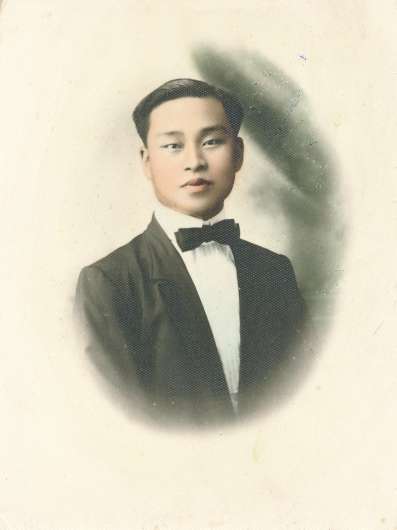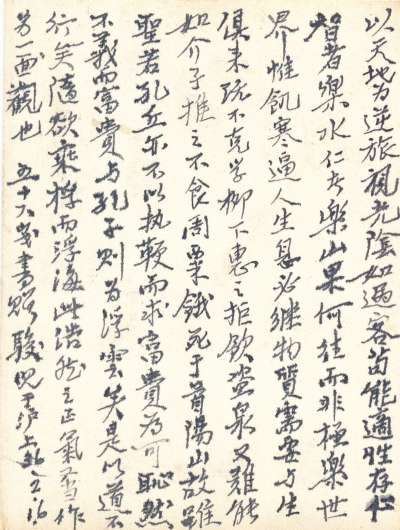T. T. Chang's Farewell Message to son K. T.


Since Kuo-hsia knows better than anyone else father's last years, we will let him cover that period. I'll talk is very brief, just a few words.
Father was the son of a minister and he was greatly influenced by the traditions of religion, such as saying a prayer before a meal. When I was about to leave for the United States after I had taken all the examinations, he - I think Kuo-ho had the same experience - asked me to go up to his room and, kneeling down together, he said a prayer ... I did not cry when he died ... now I'm crying. (Go ahead and cry ... it's all right to cry.) Father then gave me a photograph of himself ... first he gave me a wallet, a very good one, made of leather, with a gold trim. The wallet was given him by the company and he gave it to me. (More sobbing; Kuo-ho and Kuo-hsia went up to embrace him, patting his back.) He gave me a wallet-size photograph on the back of which he had written something. I was young then and did not pay much attention to what he had written, I just sort of skimmed through it.
The photograph was something of a surprise to me. Why? Because father was 56 then. Yet the photograph was of him when he was young, say, about 24. This was quite out of my expectation. The photograph was put inside the wallet and this wallet ... I carried all my life.
While I was thinking about this the other day, I thought I should take the photograph out, make copies of it and distribute it to one each. The photograph has an essay by him in the back. I did not read it carefully when I was young. Now as I study it, over and over, I find it full of meaning, it is well composed. This photograph is precious because it has father's handwriting and his composition and it is a picture of him, the way he wanted to be remembered, when he was very young.
Now I make the distribution of the photograph - one each. This was done by Kuo-hsia. Let's all look at the photograph. The essay was very educational, he knew when he wrote it we would not see each other again. He wrote an excellent piece. When I read it now I am deeply moved by it.
My talk is very short, this is all. I leave more time for Kuo-shia.
Thanks to third cousin Alison Bailey and her colleagues Qiu Yanting and Dr. Dai Lianbin, we have an English translation of T. T. Chang's (KT's father's) final message to KT, written on the back of his own photo.
Here is a description of the message:
This short piece mainly weaves together several quotes or allusions from Confucius (sometimes not completely accurately), plus an allusion to Confucius' famous disciple Mencius and a quote from a preface to a poem by Li Bai. The main theme behind these allusions is to retain one's moral integrity as much as one can, even in trying to make a living or to survive or seek wealth -- in all cases one should behave with integrity, but without going to impossible extremes (i.e. be realistic but honest in all your endeavours). Be virtuous and act with moderation.
And here is the detailed translation, with footnotes:
Both Heaven and Earth are simply inns [for all beings], and time goes so fast [that a hundred years are just like] a traveler.[1] Following the [moral] nature and preserving humanity (or benevolence), "the wise find pleasure in water, and the virtuous find pleasure in hills."[2] If so, you will find a paradise wherever you go. However, cold and hunger damage the human body, and people should continue their reproduction and survival. They are born with material needs. [A commoner] is unable to refuse drinking from the Theft Spring (daoquan 盜泉, i.e. ill-gotten gains) after Liuxia Hui,[3] or to follow Jiezi Tui (d. 636 BCE) in declining the Zhou offer of grains until his death of starvation on Mount Shouyang.[4] However sagely he was, therefore, Confucius did not consider it a shame to be a groom with a whip in hand to search for riches and honors.[5] Riches and honors acquired by unrighteousness were to him as a floating cloud.[6] Hence, when he found his doctrines made no headway, he wanted to get on a raft and float upon the sea.[7] This is what "vast, flowing passion-nature" [or: the flood-like qi] means,[8] which we should consider from another perspective.
Written in Shanghai in my 56th
year to Jun'er [my son Jun]. 16th February [19] 36
[36 might refer to 1936 or might refer to the 36th
year of the Republic which would be 1947]
[1]
Allusion from 李白, 春夜宴從第桃花園序. Preface to poem by
the Tang dynasty poet Li Bai (Li Bo / Li Po).
[2]
Confucius, The
Analects, "Yong ye" 雍也, 6:23.
[3]
This reference is incorrect: it should refer to Confucius,
not Liuxia Hui. (Liuxia Hui was famous for his integrity
too, but the quote is about Confucius).
[4]
The reference here is incorrect: the protagonists should
be Bo Yi and Shu Qi, not Jiezi Tui. (Bo Yi and Shu Qi were
brothers who in loyalty to the defeated Shang dynasty
refused to serve the new Zhou dynasty and died of
starvation rather than give up their integrity).
[5]
Analects, "Shu er" 述而,
7:12. D. C. Lau's translation says, "The Master said, "If
wealth were a permissible pursuit, I would be willing even
to act as a guard holding a whip outside the marketplace.
If it is not,
I shall follow my own preferences."" (87).
[6]
Analects, "Shu er", 7:16. D.C. Lau: "The Master said, "In
the eating of coarse rice and the drinking of water, the
using of one's elbow for a pillow, joy is to be found.
Wealth and rank attained through immoral means have as
much to do with me as passing clouds."" (88).
[7]
Analects, "Gongye Chang" 公冶長, 5:7. Lau translation: "The
Master said, "If the Way should fail to prevail and I were
to put to sea on a raft, the one who would follow me would
be Yu." Tzu-lu [Yu], on hearing this, was overjoyed. The Master said,
"Yu has a greater love for courage than I, but is lacking
in judgement."" (77)
[8]
Mencius, "Gongsun Chou I" 公孫丑上. (See Lau, transl. Mencius76-80;
"the flood-like ch'i [qi]" which is the breath that fills
the body -- one which "unites rightness and the Way." One
must develop this ch'i to become a good man. Lau introduction:
25).